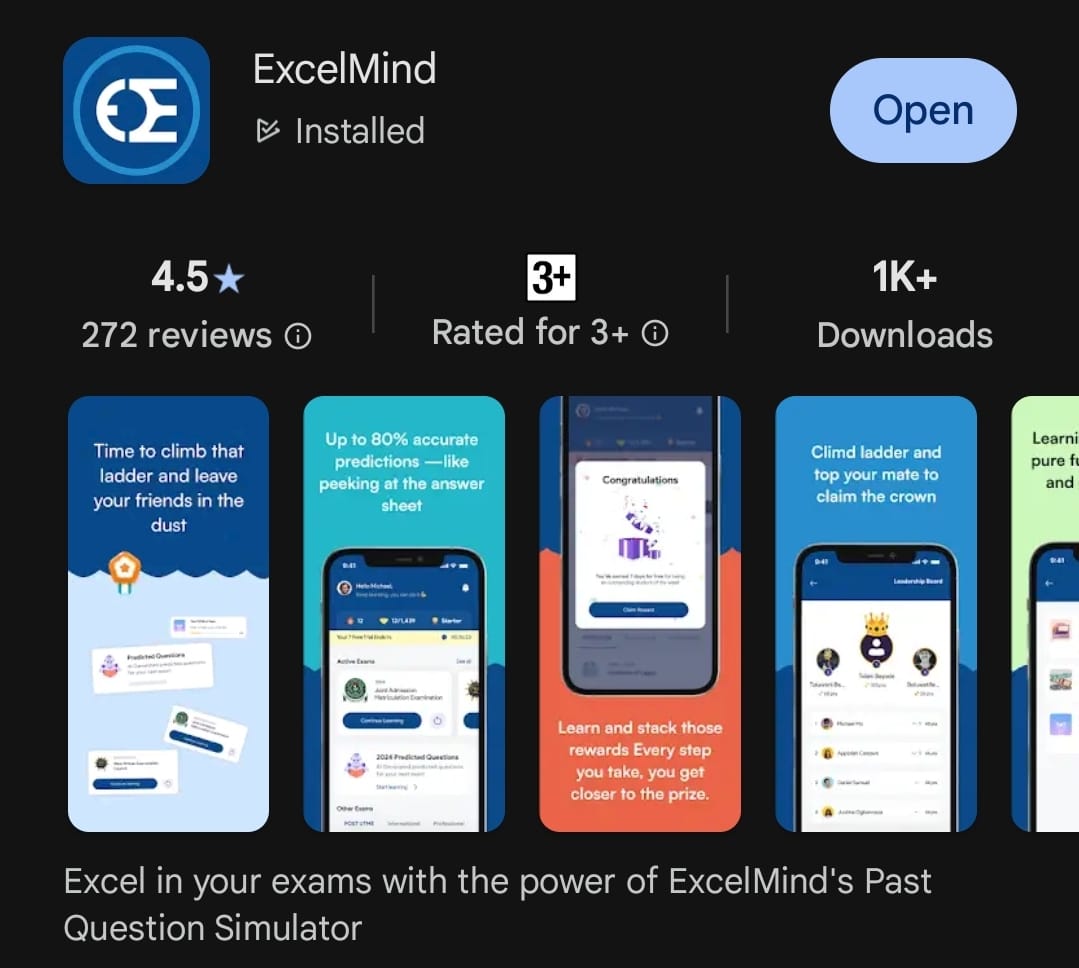Physical Address
304 North Cardinal St.
Dorchester Center, MA 02124

Are you ready to learn how to get a band 9 in the IELTS Listening test in one sitting? It may seem impossible, but it’s actually very achievable when you know exactly what to do. If you’re worried about listening to fast speakers, confusing accents, or missing important details, don’t stress. With the right preparation, you can overcome these obstacles and perform excellently on the test.

In this article, you’ll discover the most effective tips for mastering IELTS Listening. Plus, we’re going to introduce you to a game-changing tool that will make your journey smoother—the ExcelMind app. This app is designed to help you pass the IELTS in one sitting by sharpening your listening skills and preparing you for every challenge the test presents. So, let’s get to it.
Read Also: When is the Next IELTS Exam in Nigeria? And Unlock Success
Before we talk about how to get Band 9 in IELTS Listening, let’s quickly go over the test structure. The Listening section has four recordings, and for each, you will need to answer 10 questions. These recordings cover a wide range of accents, from British to Australian and American, so you need to be prepared for anything.

Here’s a breakdown of the four sections:
Each section becomes more difficult as you progress, so the challenge increases. The test lasts for about 30 minutes, followed by 10 minutes to transfer your answers to the answer sheet. Since the recordings are played only once, you need to stay alert and focus throughout the entire section. Now, let’s move into how to actually get Band 9 in IELTS Listening.
Achieving Band 9 in IELTS Listening is no small feat, but with consistent practice and the right techniques, it’s completely within your reach. Let’s break down the strategies you need to master.
The first step to getting Band 9 in IELTS Listening is to know your weak spots. Do you struggle with understanding specific accents? Are you missing out on important details because you’re distracted? Identify what challenges you the most—whether it’s accents, timing, or distractions—and focus on improving those areas.
Use apps, podcasts, or online listening exercises to target your weaknesses. The ExcelMind app offers personalized listening exercises that adapt to your level, helping you tackle your weaknesses directly and efficiently.
In the IELTS Listening test, you’ll encounter various English accents, including British, American, Australian, and Canadian. If you’re not familiar with these accents, you might miss key details during the test. To improve your understanding, practice listening to different accents regularly.
The ExcelMind app features listening exercises with a wide variety of accents. This is a huge advantage because you’ll become accustomed to different speech patterns, pronunciation, and dialects. By regularly listening to content in different accents, you’ll be more prepared for anything the test throws at you.
One of the most common tricks in the IELTS Listening section is distractors—where speakers change their answers or correct themselves. This can trip up many candidates. To avoid falling for distractors, practice staying focused and listening for corrections.
By using the ExcelMind app, you’ll be trained to anticipate these changes. The app provides exercises that simulate real IELTS Listening tests, where you can practice spotting distractors and improving your reaction time.
Before the listening recordings begin, you’re given 30 seconds to read the questions. Use this time wisely to get an idea of what you’ll be listening for. Underline key words and predict what information might be included in the answers.
The ExcelMind app can guide you through practice exercises where you learn how to maximize your 30 seconds of reading time. By practicing this skill, you’ll be able to approach the real test with more confidence.
You won’t hear the exact words from the question in the listening recording. Instead, you need to focus on the synonyms or paraphrased versions of those words. This is where most candidates lose marks—because they’re waiting for the exact word instead of the idea.
The ExcelMind app teaches you how to listen for key phrases and synonyms through interactive exercises. This training will help you understand the meaning behind the words, even if they’re not the exact ones you expected.
The IELTS Listening test requires you to read, listen, and write all at once. This can be overwhelming, especially if you’re not used to multitasking. The key is to practice this skill so that it becomes second nature.
The ExcelMind app helps you improve your multitasking skills by providing practice exercises that require you to listen, read questions, and write answers simultaneously. The more you practice, the better you’ll get at handling the multitasking demands of the actual test.
In some sections, you’ll be asked to label maps or complete diagrams. When doing this, it’s important to use short forms to save time. For example, use “R” for “right” or “L” for “left.” This will allow you to quickly jot down the information without losing focus.
The ExcelMind app provides specific exercises on diagram labeling, helping you practice using abbreviations and shortcuts effectively.
Spelling errors can cost you valuable points, so be sure to check your answers for accuracy. Even small spelling mistakes can lead to losing marks.
The ExcelMind app features a built-in spelling check feature that alerts you when you’ve made common spelling mistakes, helping you become more mindful of accuracy.
The Listening section has a strict time limit, and you must finish all your answers before the clock runs out. To build stamina and time management skills, practice under time pressure.
The ExcelMind app allows you to simulate test-like conditions, where you can practice completing listening exercises within the same time limits as the real exam. This will help you manage time effectively and avoid rushing during the test.
Finally, focus is key to scoring Band 9. You will only hear the recording once, so it’s crucial to stay alert throughout the entire test. If you miss an answer, don’t panic. Keep going and come back to it during the 10-minute review period.
The ExcelMind app also includes calming techniques and focus-enhancing exercises to help you maintain concentration. With practice, you’ll be able to keep your composure during the actual exam.
Also: How the IELTS Exam is Conducted: Your Road to Success in One Sitting
We know that improving your IELTS Listening skills is important, but what if you could earn while you learn? Starting today, we’re launching the 30k Naira Cash Giveaway, and you can win 30,000 Naira simply by using the ExcelMind app. Here’s how it works:

It’s that simple! Once you complete the steps, you’ll earn 30,000 Naira! Plus, you’ll be one step closer to Band 9 in IELTS Listening. It’s a win-win!
You may be wondering, “How can the ExcelMind app really help me achieve Band 9 in IELTS Listening?” The answer is simple: ExcelMind is built to help you practice smartly and efficiently, guiding you through every aspect of IELTS Listening preparation.

By consistently using ExcelMind, you’ll be equipped with all the tools and techniques needed to score Band 9 in IELTS Listening. Whether you’re at home, on the go, or in between study sessions, ExcelMind will ensure that you’re always progressing. And don’t forget, our 30k Naira Cash Giveaway can help you earn cash as you improve your skills.
See Also: What Is the Passing Score of IELTS? Ansered! 2025
Now that you know how to get Band 9 in IELTS Listening, it’s time to put these strategies into action. The ExcelMind app is your ultimate solution, offering personalized and efficient preparation to help you pass the IELTS Listening test in one sitting. Don’t waste time on outdated methods—download ExcelMind today and start practicing smarter, not harder.
Ready to ace the IELTS Listening test and earn some cash? Download ExcelMind now, start practicing, and join our 30k Naira Cash Giveaway! Share your referral code, get 10 people to sign up, and you could win 30k Naira every week. Your dream score is just a few steps away!
Are you ready to crack how to get band 9 in IELTS Listening test in one sitting? It may seem impossible, but it’s actually very achievable when you know exactly what to do. If you’re worried about listening to fast speakers, confusing accents, or missing important details, don’t stress. With the right preparation, you can overcome these obstacles and perform excellently on the test.
In this article, you’ll discover the most effective tips for mastering IELTS Listening. Plus, we’re going to introduce you to a game-changing tool that will make your journey smoother—the ExcelMind app. This app is designed to help you pass the IELTS in one sitting by sharpening your listening skills and preparing you for every challenge the test presents. So, let’s get to it.
No, getting a Band 9 in IELTS is challenging. It requires excellent skills in listening, reading, writing, and speaking, along with consistent practice and preparation.
The time required for IELTS preparation to achieve a Band 9 depends on your current level of English. On average, it may take 3 to 6 months of consistent study, focusing on all sections of the test. If you’re starting from a higher proficiency level, you may need less time.
In IELTS Reading, scoring 30 out of 40 typically corresponds to a Band score of 7.0. However, the exact Band score can vary slightly depending on the test’s difficulty.
Many test-takers find Section 3 of the IELTS Reading test the most difficult. This section contains the longest and most complex texts, often requiring a deeper understanding of the material, critical thinking, and the ability to identify specific details.